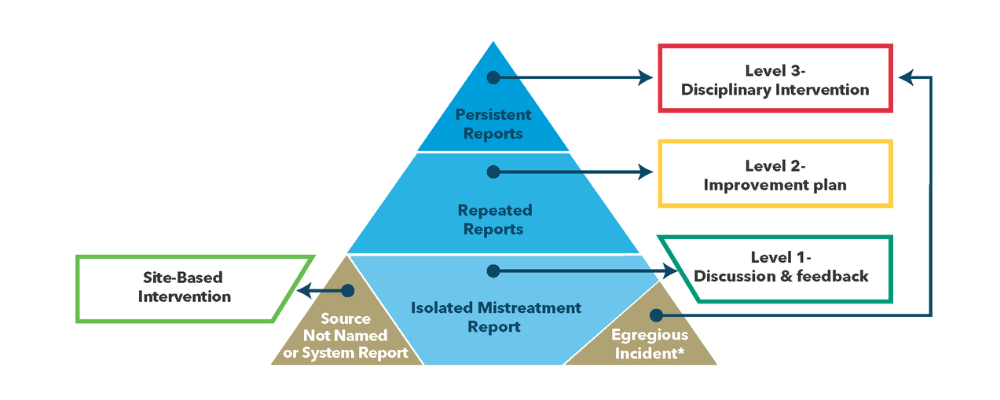What if I am reported for mistreatment?
- Mistreatment Report Response
-
When the OPRL receives a report of mistreatment the office report is reviewed and triaged by the office.
If the person reporting the mistreatment has self-identified, the OPRL director will reach out to let the person know that their report has been received and to obtain any additional information.
The OPRL Director will then investigate the report by speaking with the individuals involved and the report will be classified according to severity.
- Level I report: Single incident
- Level II report: Multiple reports involving same individuals or more serious reports
- Level III report: Egregious reports or continued reports involving same individuals despite intervention.
Level II and III reports will be discussed with the Committee on the Learning Environment.
If no mistreatment was identified, education will be provided to the learner.The person reporting will receive a follow up call from the Director of the OPRL to let them know that their report was investigated and how it was managed.
- What happens when I report mistreatment?
-
If you have provided your contact information, the Director of the OPRL will reach out to you to confirm that your report was received and to obtain any additional information needed. The OPRL director will also discuss with you the timing of when you would like your concern addressed. You may opt for no action be taken until after grades are completed or a specific rotation has finished. .
The Director of the OPRL will then investigate your concern.
The Director of the OPRL will follow up with you to let you know:
- If this was mistreatment how it was managed
- If this was determined not to be mistreatment, why it was not.
Your information is available ONLY to the Director of the OPRL and will not be provided to the individuals involved in the mistreatment.
Learn more about the procedure for investigating allegations of mistreatment
- What if I choose not to identify myself to the OPRL?
-
If you decide to report anonymously, you will not receive any feedback about how your report was managed.
In this case, please add as many details as possible to your report so that it is actionable. For example, a report that simply states, "I was yelled at during my pediatric clerkship", is not one that the OPRL can investigate. An example that would be useful is one that says, "Dr X became angry when I did not know the vital signs at rounds and told me in a raised voice that, "even a child should have known this information" during rounds. This happened in front of the entire team".
- What information should I include in my report?
-
A report should be as specific as possible. A report that says "I was yelled at during my pediatric clerkship" is not actionable. In this case, the OPRL will log the report, but no intervention will be taken unless a pattern is noticed by the OPRL.
A report that states the people involved (and if you do not know names, as much description as possible is useful). For example: In the OR at Sinai on May 1, I was scrubbed in OR 5 with Dr P. Before the first case of the day, the nurse in the room told me in a loud voice that she really hoped "I did not slow down the cases today because students always slow the case down when they suture because we don't know what we are doing. I should just stay out of her way." In this circumstance, the OPRL will investigate to determine which nurse was involved and will then be able to have a conversation with the specific person involved. This is a much more useful and detailed report.
- How are reporters protected from retaliation?
-
The GW SMHS mistreatment policy prohibits retaliation for reporting mistreatment. The OPRL will also work with the person reporting to ensure that they are not subjected to retaliation in several ways:
- The person reporting may choose when the OPRL will address their concern (end of rotation, end of grading period, end of academic year, for example).
- If the person reporting chooses to identify themselves to the OPRL, this will remain confidential. This means their identity will not be disclosed to the person who is identified in the report.
- Reporters may also choose to submit information anonymously, in which case no follow up will be provided, and the information must be specific and complete for the concern to be addressed.
If you believe that you have been retaliated against, it is important that you report this to the OPRL so that they may investigate and support you as needed.
- What happens with reports of sexual harassment or discrimination based on sex/gender?
-
The OPRL will refer cases that involve sexual harassment and discrimination based on sex to the Title IX office. Under the GW Title IX Policy, all GW faculty are Designated Reporters, and are required to report alleged sexual harassment and discrimination. Designated Reporters must report all known information, including the identities of the parties, the date, time, and location, and any details about the reported incident to the Title IX Coordinator. Designated Reporters may provide support and assistance to a Complainant, witness, or Respondent, but they cannot promise confidentiality or withhold information about Sexual Harassment. Failure by a Designated Reporter to report suspected or alleged Sexual Harassment in a timely manner may subject them to appropriate discipline, including removal from a position or termination of employment.

*Egregious: willful or reckless disregard of policies, procedures, or law; malicious intent; causing major harm (or potential harm) to individuals, groups or organization (from Mayo Clinic, 2020)